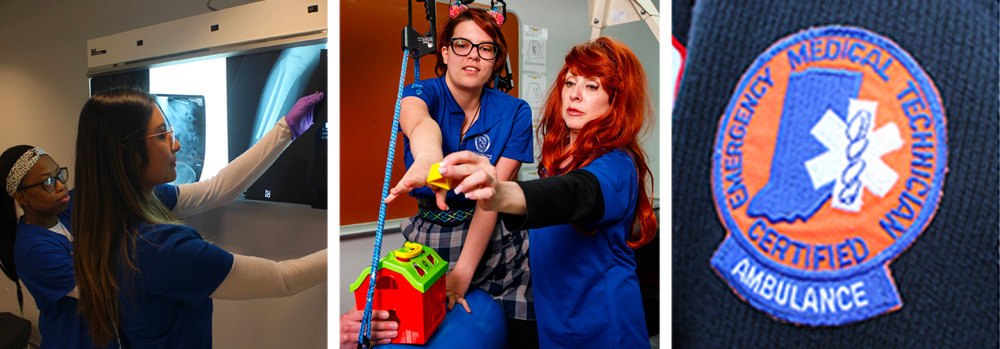
Program Offerings
- Coding Specialist Program
- Community Health Worker Program
- Echocardiography Program
- Emergency Medical Services (EMS) Paramedic Program
- Emergency Medical Technician (EMT) Program
- Magnetic Resonance Imaging (MRI) Program
- Medical Assistant Program
- Occupational Therapy Assistant Program
- Patient Care Technician Program
- Pharmacy Technician Program
- Phlebotomy Program
- Pre-Pharmacy Transfer Curriculum
- Radiologic Technology Program
Technical Standards for Admission
The Department of Allied Health & Career Program faculty have specified the following nonacademic criteria (technical standards) which all applicants are expected to meet in order to participate in the Department of Allied Health Programs.
- Observation
The applicant must be able to participate actively in all demonstrations, laboratory exercises and clinical experiences in the professional program component and to assess and comprehend the condition of all patients/clients assigned for examination, diagnosis and treatment. - Communication
The applicant must be able to communicate effectively and sensitively with patients/clients in order to elicit information; describe changes in mood, activity and posture; assess non-verbal communications; and be able to effectively and efficiently transmit information to patients/clients, fellow students, faculty and staff, and all members of the health care team. - Motor
The applicant must have sufficient motor function to elicit information from patients/clients by appropriate diagnostic or therapeutic maneuvers; be able to perform basic tests; possess all skills necessary to carry out diagnostic or therapeutic procedures; be able to interpret movements reasonably required to provide general care and emergency treatment to patients. - Intellectual/Conceptual Integrative and Quantitative Abilities
The applicant must be able to measure, calculate, reason, analyze, evaluate and synthesize. Problem solving, the critical skill demanded of allied health practitioners, requires all of these intellectual abilities. In addition, the applicant must be able to comprehend three-dimensional relationships and understand the spatial relationships of structure. - Behavioral and Social Attributes
The applicant must possess the emotional health required for full utilization of the applicant’s intellectual abilities; the exercise of good judgment; the prompt completion of all responsibilities attendant to care of patient/client; and the development of mature, sensitive and effective relationships with patient/clients. Applicants must also be able to tolerate taxing workloads, function effectively under stress, adapt to changing environment, display flexibility, and learn to function in the face of uncertainties inherent in clinical problems of many patients/clients. Compassion, integrity, concern for others, interest and motivation are personal qualities which each applicant should possess.

